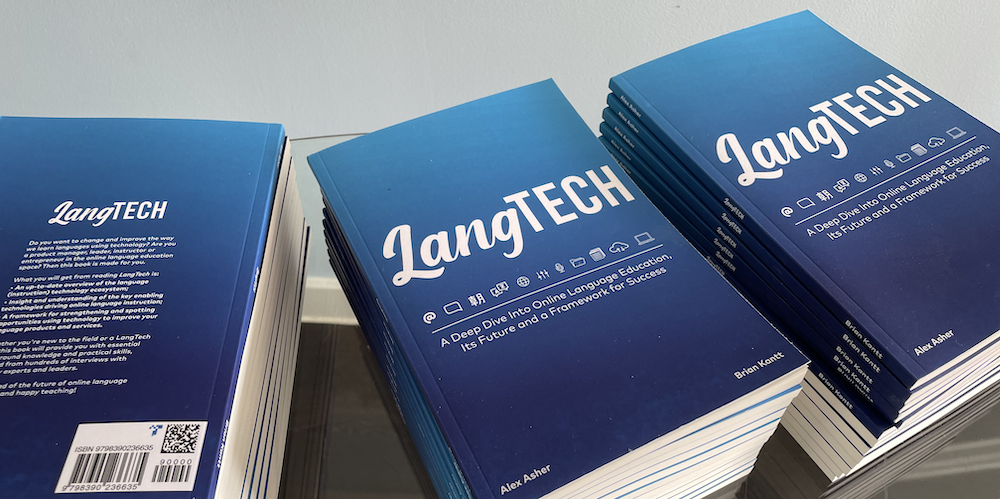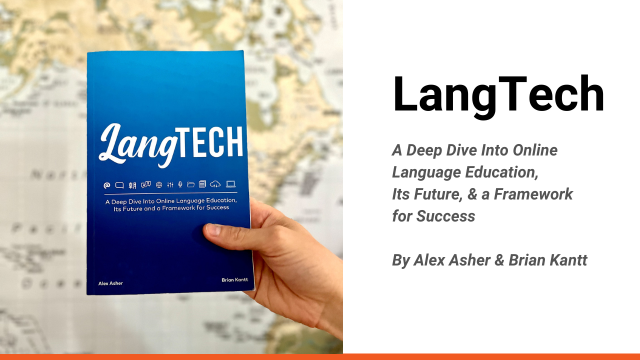In the Age of AI, technology is evolving at a crazy-fast pace. As a leader of a language company, it's easy to feel overwhelmed, rushed, threatened and excited all at the same time.
Two edtech experts have just published their new book, LangTech, as a response to this new age:
Below is an interview with Alex and Brian that explores the reasons, rationale and results of their book
Why did you write the LangTech book?
We started because we noticed a big gap. Alex was fairly new to the language education sector, having joined the virtual classroom software startup LearnCube, in 2017. At that point (and now) The knowledge around language (instruction) technology was scattered, incomplete and disorganised.
Could we make sense of this space we call 'home' professionally?
We wanted to create a way of talking about our space; language (instruction) technology.
From there, the conversations started happening. We started interviewing language leaders... and now, three years later, we published LangTech: A Deep Dive Into Online Language Education, Its Future and a Framework for Success on Amazon and Kindle.
Who is the LangTech book written for?
The book offers the most value to leaders, product owners, product managers and ambitious entrepreneurs teaching English, or other languages, online.
You can get your own copy here on Amazon or Kindle.
What do you mean by "LangTech"?
We had to spend a lot of time thinking and discussing particular words and phrases in the book to ensure they conveyed the right meaning.
We define LangTech as “the companies, people and programs that create or use technology to support or enable language learning at scale.”
To keep the focus of the book, we restricted our scope to "online language instruction" and deliberately skimmed over interesting areas of language education that likely deserve their own book(s), such as online language assessment, the technology used in physical language classrooms and peer-to-peer learning.
The first section of the book explores the differences between HPI, MPI and Mixed Instruction, can you explain these in more detail?
Human-Powered Instruction (HPI) is when a human being is the main driver behind the instruction delivered to the learner. For example, Lingoda or Italki.
Machine Powered Instruction (MPI) is where a machine or computer program is the main driver behind the instruction delivered to the learner. For example, Duolingo or Speak.
Mixed Instruction is a combination of the two. You can see Babbel pursuing this strategy and most corporate language training businesses will have a system for live online classes and self-study learning.

You go into great detail about five enabling technologies. Tell me briefly why you think these have the most potential to shape the future of LangTech?
We feel these five technologies will likely have the biggest impact on language education:
1. Modern user interfaces:
These include Virtual Classrooms and Web & Mobile Applications. While they are a long time in coming of age, Augmented Reality (AR) and Virtual Reality (AR) also offer interesting opportunities for language instruction.
2. Management software and systems;
Software is not new but is fundamental to building high-scale operations. Online School software is critical for HPI businesses to efficiently scale teachers and online classes, while Learning Management Systems or bespoke applications are essential for MPI businesses.
3. Assessment technology;
This area of language education is a rich area to explore, and we briefly discuss the impact of technology in enabling non-automated, semi-automated and fully-automated digital assessment.
4. Big data;
We feel this term might be a bit dated, but the idea is relevant. Companies that can gather relevant data and use that responsibly to improve learning outcomes will be the winners over the next 3 - 5 years. We could broaden this now with the idea of Large Language Models, but who knows, by the end of the year, "Not-quite-so-large Language Models" may be enough to transform companies and learning outcomes.
5. Artificial intelligence (AI).
This is the biggest buzzword of the year. While there is a lot of hype, I think this will play out to be one of the most important technologies of our generation. I'm excited about how LearnCube and other LangTech companies will leverage AI to augment teachers teaching English online and empower students.
You developed the PP-PS framework - Why do you think it's useful to leaders and product managers?
This popped up as a result of dozens of interviews with other language leaders and online school owners in research for the book.
The PP-PS development framework helps decision-makers balance learning effectiveness and commercial viability in their LangTech company, product, or feature.
The framework can be used as a spotlight for evaluating current products, as a common language between departments and as a tool for designing new features, products, and services delivering language instruction.
What makes you feel the PP-PS can work in practice?
This is a very practical framework and tool.
There are four key qualities we suggest leaders balance. Making your product or service:
1. Personal
2. Practical
3. Profitable
4. Scalable.
In the last chapter of the book, we show how the framework can be applied for common LangTech businesses.
For LangTech businesses selling B2B, the "learning experience is a product of a learner’s input" as well as the client's input.
We'd also suggest that with companies and language schools considering an AI product, feature or service, execution is everything. You can imagine an AI tutor that seemingly scores well on the PP-PS, but users give up after just one try. Tapping into the personal motivations of the user may be the biggest challenge (and opportunity).
What do you predict will be the impact of AI on language education more broadly? Will we even bother learning languages in 5 years' time?
The quick answer is that we believe that while machines and algorithms will assist so many aspects of language learning, the human teacher and the human-to-human connection will remain - just as it does with speaking a language - at the heart of language learning.
To read a longer answer, check out our related article: Why Should Language Businesses Care About ChatGPT & Artificial Intelligence?
How can someone buy the book?
👉 You can get your own copy here on Amazon or Kindle.

 Head of Education at LearnCube & Expert Online English Teacher
Head of Education at LearnCube & Expert Online English Teacher